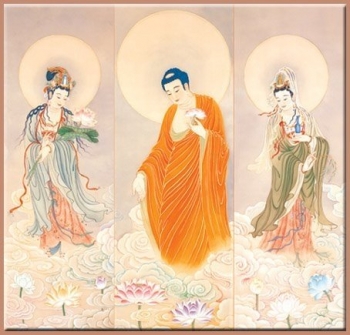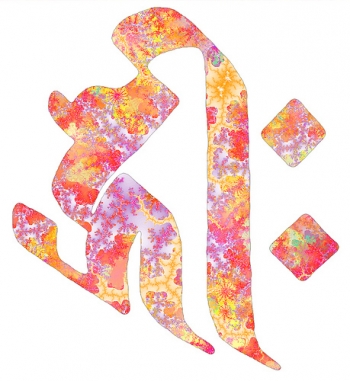In one’s life, there are certain kinds of transitional events that are considered distinct turning points: the attainment of a qualification, the conferral of a degree, the awarding of an honor or military title, or perhaps the achievement of a religious title. For me, it was a moment I still recall very, very clearly.
In Buddhism, we generally refer to Buddhist people as belonging to the Fourfold Community: which is made up of monks, nuns, laymen and laywomen. More specifically, the monastic and lay echelons are quite different in their religious nature and practice due to the extent of the vows taken. A lay Buddhist (up?saka) may be formally initiated by ‘taking refuge’ (belief in the Buddha, Sangha, Dharma), and at a minimum will vow to undertake the Five Precepts. In traditional Chinese Buddhism, a newly initiated up?saka (translated as “attendant”) has the title of ?~?h (ju shi). He or she, receives a Refuge Certificate (?ԧ??ҷ?) from his/her master, which validates the Dharma name (?k?W) that the master has bestowed on the individual. For a Buddhist, whether a lay or monastic member, the Dharma name is a religious name that functions in a “special space,” a transcendent dimension of the Buddhist practice. The name carries great spiritual significance, and also implies immense personal responsibility on the individual.
My own Dharma name is ????, which I received at Guan Yin Temple in Hong Kong. At the time, I felt extremely unworthy when my beloved preceptor - my master - gave me that name, because the name in its literal sense, means “basic benevolence,” or basically benevolent. I vividly remember feeling rather strange and surreal when he offered the reason for bestowing my name: he had observed my face and behavior, and apparently decided “I had a kind and benevolent countenance”. Even taking into account a monk’s preference to encourage rather than discourage, I struggled to take his evaluation at face value. My simple reason was that I personally felt that I was mired in delusion, frustration, and too many negative habits of mind to even begin to assess myself as “simply benevolent.”
My own Dharma name is ????, which I received at Guan Yin Temple in Hong Kong. At the time, I felt extremely unworthy when my beloved preceptor - my master - gave me that name, because the name in its literal sense, means “basic benevolence,” or basically benevolent. I vividly remember feeling rather strange and surreal when he offered the reason for bestowing my name: he had observed my face and behavior, and apparently decided “I had a kind and benevolent countenance”. Even taking into account a monk’s preference to encourage rather than discourage, I struggled to take his evaluation at face value. My simple reason was that I personally felt that I was mired in delusion, frustration, and too many negative habits of mind to even begin to assess myself as “simply benevolent.”
Of course, I wish that my mind were so simple and pure to be able to always give, give, and give more. But, that in truth is only the ideal of the Dharma name, not the reality. Worse yet, just like any normal human being, I can forget (out of a bad memory or arrogance or other weaknesses…) too easily the import, and sense of responsibility that a Dharma name demands. This (good kind of) shame shakes my torpid self back into a better alertness about just what I got myself into some years ago. I remember my refuge-taking ceremony so well, back in 2008, when I kneeled before my master’s altar and mumbled - extremely awkwardly - after his intonations of my vows. I am surprised looking back that he did not ‘boot me out’ after mucking up the classical Chinese again and again.
Three years along I continue to review the meaning of being a Buddhist up?saka – at times, the more I am aware of what I have been blessed with, the more embarrassing my minor mistakes can feel. It is as if the mere knowledge that “this is who I am” sensitizes me to all sentient beings, and sharpens my awareness and connection to the results of anyone’s actions in the world. If anything, a Dharma name alerts a person to his or her own weaknesses and failings, but also raises each of us up to new and positive expectations. If we wish to uphold these names properly, that is, to hold them in good faith and honor, we each need to remember that crucial moment when our master asked us some very simple questions:
Three years along I continue to review the meaning of being a Buddhist up?saka – at times, the more I am aware of what I have been blessed with, the more embarrassing my minor mistakes can feel. It is as if the mere knowledge that “this is who I am” sensitizes me to all sentient beings, and sharpens my awareness and connection to the results of anyone’s actions in the world. If anything, a Dharma name alerts a person to his or her own weaknesses and failings, but also raises each of us up to new and positive expectations. If we wish to uphold these names properly, that is, to hold them in good faith and honor, we each need to remember that crucial moment when our master asked us some very simple questions:
“Why do you wish to take refuge?
Why do you want to undertake the Five Precepts?
Why do you want to be a Buddhist,
and Why do you want others to know you as a Buddhist?”
In my particular case, the meaning had something to do with my favorite scripture found in the Avata?saka S?tra. I think I explained that it was the Buddhist scripture that informed, and called me to the truth, mission, and way of life of the Dharma. It was an honest answer, but awkwardly expressed. I think my master was able to see my sincerity despite my obvious incompetence - hence his quiet nod of approving recognition. Symbolically, a Dharma name is far, far more than simply a religious title. It carries the full potential of new life that one can live in the light of the Buddha’s nimbus. It is a new call to spiritual activity and a personal motivation to engage with anything in the world that inspires, horrifies, or saddens.
For me, it has been the most demanding title and qualification of all!
For me, it has been the most demanding title and qualification of all!
















